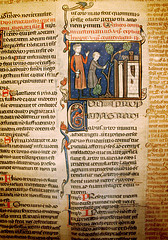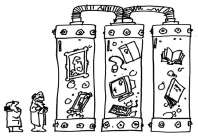 À travers un épique récit de l’histoire de Wikipédia (mais surtout de ses propres péripéties), Nicholson Baker fait le compte rendu de l’ouvrage Wikipedia: The Missing Manual
À travers un épique récit de l’histoire de Wikipédia (mais surtout de ses propres péripéties), Nicholson Baker fait le compte rendu de l’ouvrage Wikipedia: The Missing Manual
de John Broughton. Approche jubilatoire : récit des premières expérimentations, traces des différentes cultures ayant eu cours au sein de ce projet, puis relation des tentatives de Baker lui-même de s’inscrire dans la communauté des éditeurs de Wikipédia.
After bovine hormones, I tinkered a little with the plot summary of the article on Sleepless in Seattle, while watching the movie. A little later I made some adjustments to the intro in the article on hydraulic fluid—later still someone pleasingly improved my fixes. After dessert one night my wife and I looked up recipes for cobbler, and then I worked for a while on the cobbler article, though it still wasn’t right. I did a few things to the article on periodization. About this time I began standing with my computer open on the kitchen counter, staring at my growing watchlist, checking, peeking. I was, after about a week, well on my way to a first-stage Wikipedia dependency.
Et tranquillement Baker de se révéler un inclusionniste dans l’âme, questionnant l’attitude de plusieurs visant à sabrer dans les pages qui ne sont pas justifiées par un sujet notable.
At the same time as I engaged in these tiny, fascinating (to me) « keep » tussles, hundreds of others were going on, all over Wikipedia. I signed up for the Article Rescue Squadron, having seen it mentioned in Broughton’s manual: the ARS is a small group that opposes « extremist deletion. » And I found out about a project called WPPDP (for « WikiProject Proposed Deletion Patrolling ») in which people look over the PROD lists for articles that shouldn’t be made to vanish. Since about 1,500 articles are deleted a day, this kind of work can easily become life-consuming, but some editors (for instance a patient librarian whose username is DGG) seem to be able to do it steadily week in and week out and stay sane. I, on the other hand, was swept right out to the Isles of Shoals. I stopped hearing what my family was saying to me—for about two weeks I all but disappeared into my screen, trying to salvage brief, sometimes overly promotional but nevertheless worthy biographies by recasting them in neutral language, and by hastily scouring newspaper databases and Google Books for references that would bulk up their notability quotient. I had become an « inclusionist. »
Et on entre là dans un monde virtuel, plus près du jeu que de la communauté scientifique (car ça se révèle un terrain de jeu pour querelles et jeux de pouvoir typiques de l’enfance. Se pose la question du canon (« Still, a lot of good work—verifiable, informative, brain-leapingly strange—is being cast out of this paperless, infinitely expandable accordion folder by people who have a narrow, almost grade-schoolish notion of what sort of curiosity an on-line encyclopedia will be able to satisfy in the years to come. ») ; émerge la problématique de la définition de ce projet, dont Baker rappelle qu’il est en fait mené par un nombre très restreint d’éditeurs qui imposent leur vision d’une encyclopédie libre et ouverte — pourtant régie par des règles très sévères, pourtant constamment patrouillée par des éditeurs et des logiciels évitant sa propre implosion en raison de modifications humoristiques ou malveillantes.
Le plus stimulant, outre la prose jubilatoire de Baker, c’est certainement le mode d’autorégulation de cette communauté, qui est à l’évidence game-driven — tiens, un peu comme l’est le Nomic, mais avec une dose de responsabilité culturelle et politique, avec un sens du devoir.
Ce qui nous manque pour l’instant, c’est encore une lecture comparée des dynamiques sociales propres aux sphères linguistiques (on ne parle jamais que du Wikipédia de langue anglaise). Comment se gèrent les tensions colonialistes dans la sphère hispanophone? Quelle vision du monde est proposée par des encyclopédies issues de langues qui ne sont pas parmi les trois ou quatre lingua franca mondiales?
Baker conclut son expérience comme il clôt son texte :
I think I’m done for the time being. But I have a secret hope. Someone recently proposed a Wikimorgue—a bin of broken dreams where all rejects could still be read, as long as they weren’t libelous or otherwise illegal. Like other middens, it would have much to tell us over time. We could call it the Deletopedia.
(via Willard McCarty, Humanist) (photo : « The work of a scribe », glynnish, licence CC)
 François Bon
François Bon  Se tenait à Québec, il y a une semaine précisément, une deuxième
Se tenait à Québec, il y a une semaine précisément, une deuxième